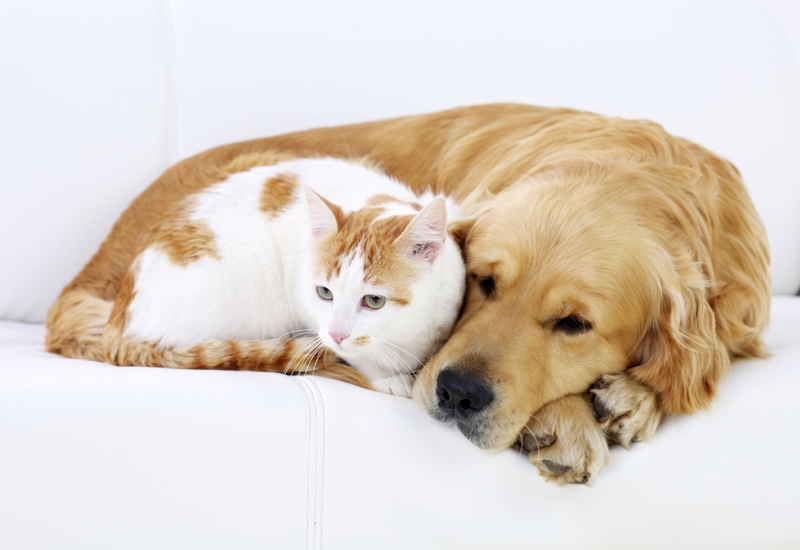
It’s not uncommon for pets to be reluctant to take a pill. Just imagine how icky the medication must smell to their superior little noses! Fortunately, there are lots of tricks for getting your dog or cat to gobble up a pill with no problem.
Top Tricks to Giving a Dog Medication
When feeding peas to a small child, sometimes airplane noises work, sometimes a choo-choo sound is needed, and other times you just have to hide them in mashed potatoes. The same goes for giving a dog a pill. So, be patient, as it may take quite a few tries before you figure out what approach works best.
1. Hide It
Concealment is one of the simplest ways to give a dog a pill. Many dogs get so excited for a tasty snack that they’ll devour the whole bowl without thinking twice about the medication inside of it. But, you should always keep a keen eye out to make sure the pill doesn’t end up on the floor or in the belly of another pet.
You can try wrapping your dog’s pill in a piece of cheese or lunch meat, stuffing it inside a spoonful of canned dog food, or layering some peanut butter around it. For a smaller portion of cheese, fold a slice and tear it in half. Then, store the remaining half in the fridge with plastic wrap to use for the next dose of medicine.
A slice of cheese or turkey always works when giving a pill to my dog, Savannah!
You can also try burying the pill in a tablespoon of canned dog food and then mixing it with your dog’s dry food at mealtime. This works best for those food inhalers that swallow their kibbles down quickly without much chewing. Slow, methodical eaters may notice something suspicious mixed in with their food and pick around it.

2. Make it Special
If your companion is always careful not to swallow the pill with their dog food, switch it up with a more intriguing meal, like rice with chicken or beef. You can even mix some gravy, shredded cheese, or ground meat in with their regular food to spice it up.
The object is to present it to your dog with something that outweighs their distaste for the medication. I’ve stirred shredded cheese around in Savannah’s food before when she was very sick and uninterested in eating, and it was a successful strategy.
3. Go Old School
This method involves coaxing your dog’s mouth open, so it may not work well if you pet doesn’t like their mouth being touched.
Just a few steps:
- Have your dog sit, and gently try to pry their mouth open. I find it works well to push on a larger canine in the front.
- Place the pill in the back of their throat and close their mouth.
- Lightly hold the mouth shut to make sure the pill is swallowed. Nobody wants to pick up a soggy tablet off the floor after it’s been spit out!
I’ve found that slowly rubbing my dog’s throat can help coax her into swallowing her medication. Also, be sure to stick with one pill at a time to avoid accidental choking.
If you’re watching your dog’s weight, make sure to carefully eye the right portion of replacement food.
Keep In Mind
A Balanced Diet
If you’re watching your dog’s weight, make sure to carefully eye the right portion of replacement food. For example, if you’re going to mix some ground beef into your dog’s regular food, scoop out a lesser amount of dog food than usual to balance it with the beef.
You’ll also want to make sure you don’t give your dog too much food to finish and risk the chance that the pill remains in their bowl, untouched.
Don’t Be Deceived
It’s always good to check that the pill isn’t still in your dog’s bowl after they’ve finished eating everything else. Some dogs can be very sly by separating the pill from the stuff they like in their mouth and then spitting it out, or they may continue to pick around the pill despite the delicious food with which you’ve replaced their usual meal.
In either of these instances, you may have to be a little sly yourself and ask your veterinarian if you can crush your dog’s pills. If administering their medication like this is OK, try crushing it into a hearty dish like chicken and rice, a bit of ground beef, or other moist food that it will absorb it easily.
This method can also work for capsules with liquid medicine inside. Simply lance the capsule and pour the medicine over the food. Still, always talk to your vet before testing a new option.

Top Tricks to Giving a Cat Medication
Notoriously more finicky than their canine counterparts, cats sometimes turn their noses up at delicious food if it doesn’t suit their palate that particular day. That’s make giving them something known to be yucky-tasting, like a pill, even more difficult. Claws-crossed these suggestions make pill time easier for you both.
1. Play Favorites
Like dogs, our feline family members may easily take a pill that comes with a snack. Trying hiding a pill in their favorite soft snack. The taste of their favorite treat will hopefully cover up the distinctive taste of pill.
2. Disguise It
Some cats will swallow a pill that’s mixed right into their regular food. If you try this tactic, check your cat’s food dish after they’ve finished eating to make sure they gobbled up the medication.
Pill pockets are another great option for giving medicine to your cat. They’re small, moist treats with a hollowed-out center for inserting a pill. They come in all kinds of appetizing flavors for your kitty, like chicken and salmon. Look for them at your local pet store or retailers like Target®.
3. Mix It In
If you feed your cat wet food, crushing a pill or slicing open a capsule containing liquid medication overtop can be possible pill-giving methods. The moisture in the food will absorb the medication. This is something you should always ask your veterinarian about before attempting it, as some pills should never be opened or crushed.
If your feline simply refuses to take a pill with food, you can always try putting it right in their mouth and coaxing them to swallow. This can be a more challenging strategy, and requires patience and calmness.
Cats are sensitive to emotions, like nervousness, and can become agitated in an uncomfortable situation. So, it may benefit you both to ask your veterinarian for a demonstration to help reduce your risk of being bitten and your cat’s overall wariness of the situation.
Cats are sensitive to emotions, like nervousness, and can become agitated in an uncomfortable situation.
The basic steps for administering a pill orally are as follows:
- Coax your cat into a closed off room or space in your home.
- Swaddle them in a towel with their head protruding for safer and easier handling.
- Using your thumb and middle finger, gently open your cat’s jaw.
- Place the pill on your cat’s tongue and close their mouth.
- Lovingly stroke your cat’s throat to encourage them to swallow the pill. Speaking softly to them can help too.
Afterward, watch to see if your cat licks their lips. This is a sign that they’ve swallowed the pill. Be sure to provide plenty of water to help dissolve the pill. This is also beneficial because some medications may increase thirst.
Did your pet do well? Reward their behavior with a special treat! Here are a few ideas for homemade treats for cats and dogs.
Helpful resources for pet parents
Browse categories
-

Cat Hernias: Causes, Symptoms, and Treatment
Learn about the signs and causes of cat hernias.
-

Making Friends: Introduction & Socialization Tips
Adding a pet to your happy household? These tips can help make the transition less hairy.
-

The Real Benefits of Pet Insurance: What You Get and Why It Matters
For many people, the answer is yes! See why and find out how to lower your premium.

Browse Categories
(opens new window)
